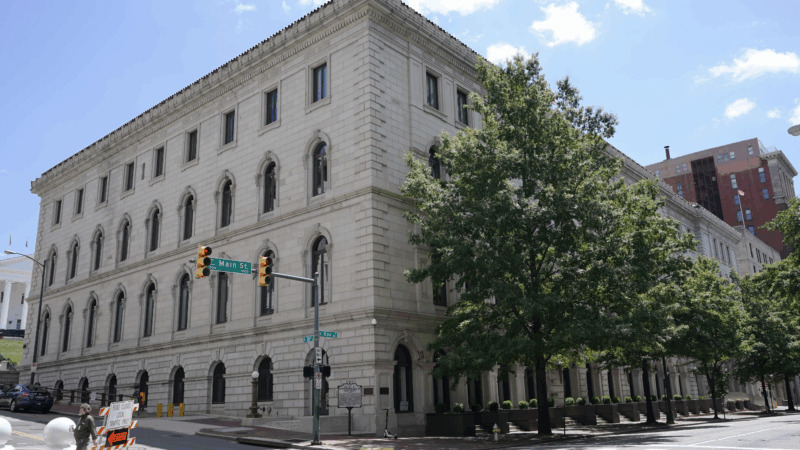Immigration Law and Schools
Students, parents, and school officials are reacting to Alabama’s new immigration law, the toughest in the nation. The law went into effect last week after a federal judge upheld many of its most controversial provisions, including a requirement that schools check the immigration status of newly enrolled students. And that extra layer of administrative responsibility may pale in comparison with the fear it’s engendered. Dan Carsen has more from the Southern Education Desk at WBHM:
Students of all hues converge through the bottleneck of the main hallway at McAdory Middle School in McCalla, Alabama. Most stream right past a reporter with a mic and earphones without missing a beat, but a few, who’d been speaking Spanish, stop talking. It’s an uncertain time for many of them. According to McAdory Principal James McCleod, “We’ve had a few Hispanic students withdraw today, and some of them tell us that more are going to be withdrawing tomorrow, over the new immigration laws. The unintended consequences are affecting and disrupting the lives of these students. It’s … it’s hurtful.”
McCleod expects more of the same in coming weeks. Cuban-born Annabelle Frank, a legal resident and mother of a six-year-old in nearby Mountain Brook, Alabama, sheds some light on why:
“I’m actually considering home-schooling. Because I don’t want him involved in all this that’s going on. I know, because he is Hispanic, in some way he’s going to be singled out, you know? I’m really afraid of that.”
School officials are troubled by that type of response, and many – even those who don’t support the new law – bristle as they try to reassure students and parents. Across the state, administrators are spreading and repeating the message: all students should continue to come to school.
Lari Valtierra is ESL Supervisor for Jefferson County Schools. She tells families in English and in Spanish, “There’s a lot of fear, and miscommunications, misunderstandings out there. Jefferson County schools are open. We are not here to turn children away. We will accept all students in our classrooms. Estamos completamente abiertos para los hispanos.”
There will be some differences outside the classroom, in school offices across the state. There’s actually a flow chart of steps for school enrollment workers to take when presented – or not presented – with a student’s birth certificate. Legally, no student can be denied education based on lack of documents, or based on the transgressions of their parents. Alabama’s 132 districts will report numbers, not names, to the state education department, which will then report annually to the legislature.
Alabama schools had already been checking birth certificates at enrollment, but now the state board of education has to calculate the costs of educating students who don’t have them.
Several district superintendents and school principals expressed unease with the extra steps. But Interim State Superintendent Larry Craven says, “If they just follow that flow chart, they’ll get through the process in nothing flat. We’re gonna have a one-hundred-percent success rate, no big deal.”
Craven also thinks the fear engendered by the law is a result of sensationalized news reports and language barriers:
“I don’t know where the misinformation is coming from, I guess all variety of perhaps media and perhaps just word of mouth. If you have difficulty understanding the language anyway … then, who knows what they’re being told.”
Many critics of the law say it’s intended to scare illegal immigrants away from the state, and many supporters don’t have a problem with that. Several groups seeking to block the law have filed an appeal of last week’s ruling. Opponents of the appeal are filing arguments with the court today.
Annual governors’ gathering with White House unraveling after Trump excludes Democrats
An annual meeting of the nation's governors that has long served as a rare bipartisan gathering is unraveling after President Donald Trump excluded Democratic governors from White House events.
Federal judge acknowledges ‘abusive workplace’ in court order
The order did not identify the judge in question but two sources familiar with the process told NPR it is U.S. District Judge Lydia Kay Griggsby, a Biden appointee.
Top 5 takeaways from the House immigration oversight hearing
The hearing underscored how deeply divided Republicans and Democrats remain on top-level changes to immigration enforcement in the wake of the shootings of two U.S. citizens.
Snowboarder Chloe Kim is chasing an Olympic gold three-peat with a torn labrum
At 25, Chloe Kim could become the first halfpipe snowboarder to win three consecutive Olympic golds.
Pakistan-Afghanistan border closures paralyze trade along a key route
Trucks have been stuck at the closed border since October. Both countries are facing economic losses with no end in sight. The Taliban also banned all Pakistani pharmaceutical imports to Afghanistan.
Malinowski concedes to Mejia in Democratic House special primary in New Jersey
With the race still too close to call, former congressman Tom Malinowski conceded to challenger Analilia Mejia in a Democratic primary to replace the seat vacated by New Jersey Gov. Mikie Sherrill.




